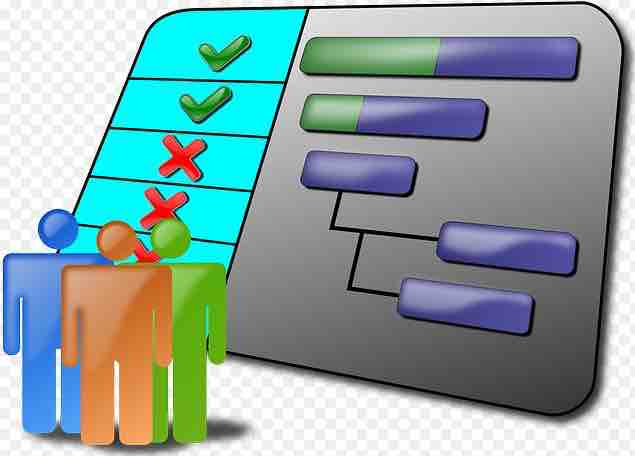Defining Agendas
An agenda, particularly from the perspective of an organization or business, is loosely defined as a organized approach toward accomplishing a series of objectives or discussing a series of points. Agendas are most commonly used in a short-term setting, such as a meeting or a given week's work plan; however, they can also be used as a longer-term strategic planning component.

Example of an agenda
An agenda sometimes combines a process flow and a checklist, where employees and management involved in a given operational process track progress and provide updates. The image above illustrates a Gantt chart, which uses a bar graph to show progress toward completion.
Business Application
In business, an agenda is commonly brought to a meeting to ensure everyone understands what will be discussed. Agendas should be distributed well before the meeting or discussion to ensure individuals attending have time to prepare their discussion points and to familiarize themselves with what others will be discussing. Reading the agenda in advance ensures that the overarching goals of a given meeting are clear and understood by all participants prior to the discussion.
Agendas may also be used as a means of highlighting current progress and projecting future progress. This type of agenda provides a timeline and tracking mechanisms for participants involved in a given project and may or may not require onsite meetings. Agendas showing project progress are often used by contractors and those in the field of project management.
Keeping Minutes
Agendas are also used broadly in the political and public domain, where meetings held by public institutions, NGOs, or political groups are approached and organized via a given agenda. Public companies have a more important relationship with agendas than private companies, as they are usually required to record meeting minutes. These minutes are essentially a verbatim record of what was discussed and are made available for public viewing and consideration. As these discussions are accessible by any and all stakeholders, the outline and preparation of a valid and relevant agenda is of particularly high importance.
Relevance to Management
Skilled managers may construct and implement an agenda in an organizational setting. Building an agenda requires broad familiarity with all critical components of a given department, project, or organizational objective. Creating a relevant agenda and distributing it to concerned parties in a timely fashion requires organizational ability, communication skills (including the ability to write clearly and concisely), and strategic know-how (knowing what to discuss and in what order). Managers must be skilled in controlling the pace, tone, and trajectory of discussions at meetings. Agendas are an excellent tool for organizing thoughts and leading discussion.
The pursuit of agendas requires a similar set of managerial skills. Ensuring follow-through and keeping employees on task and on schedule requires an ability to multitask—to oversee various aspects of a given operational area simultaneously. Good managers can balance the various interests, operations, and technical skills of a given team to ensure the objectives and timelines set forth in the agenda are carried out.